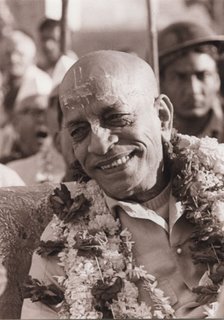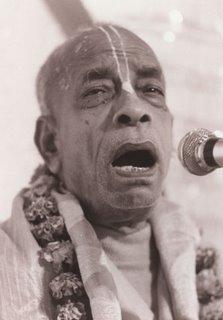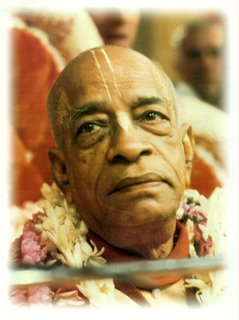
By: Nandagopal Jivan das
(Narender Nolakha)
tad-vijnanartham sa gurum evabhigacchet
samit-panih srotriyam brahma-nistham
"In order to learn the transcendental science, one must approach the bonafide spiritual master in disciplic succession, who is fixed in the Absolute Truth."
The Vedic knowledge is sometimes compared to a 'jungle of knowledge'. Not just an ordinary jungle but a very de nse jungle. In the Vedic literature there are various opinions. In the Visnu Purana it says that Visnu is Supreme. In the Siva Purana it says Siva is the Supreme. In the Markandeya Purana it says that Durga is Supreme. And in the Upanisads it is mentioned 'aham brahmasmi' - 'I am Brahman'. So one may think that there are many Gods, or that there are so many Gods that there is no God at all. We may think that what the Vedas say cannot be true because there are too many apparent contradictions. Or we may take 'aham brahmasmi' as the ultimate conclusion and then conclude that we are all God. This is what happens to persons who study the Vedas without the help of the bona-fide guru.
nse jungle. In the Vedic literature there are various opinions. In the Visnu Purana it says that Visnu is Supreme. In the Siva Purana it says Siva is the Supreme. In the Markandeya Purana it says that Durga is Supreme. And in the Upanisads it is mentioned 'aham brahmasmi' - 'I am Brahman'. So one may think that there are many Gods, or that there are so many Gods that there is no God at all. We may think that what the Vedas say cannot be true because there are too many apparent contradictions. Or we may take 'aham brahmasmi' as the ultimate conclusion and then conclude that we are all God. This is what happens to persons who study the Vedas without the help of the bona-fide guru.
Srila Vyasadeva after dividing Vedas into four and compiling the Upanishads, Puranas and other literatures, he wrote Vedanta-sutra. Vedanta means the end of knowledge. After he completed Vedanta-sutra however Vyasa still did not feel satisfied. He was not satisfied within himself. He crossed the ocean of knowledge but still he was not satisfied. Then the guru of Vyasadeva, Narada Muni, came and Vyasadeva inquired from his guru why he did not feel satisfied. Then Narada Muni said, "Without directly coming to describe the Lila of Krsna, the Supreme Personality of Godhead you have not done justice to truth. Now you have to give the meaning of all these things in one book." Then Vyasadeva wrote the Bhagavata Purana, Srimad Bhagavatam.
(Narender Nolakha)
tad-vijnanartham sa gurum evabhigacchet
samit-panih srotriyam brahma-nistham
"In order to learn the transcendental science, one must approach the bonafide spiritual master in disciplic succession, who is fixed in the Absolute Truth."
The Vedic knowledge is sometimes compared to a 'jungle of knowledge'. Not just an ordinary jungle but a very de
 nse jungle. In the Vedic literature there are various opinions. In the Visnu Purana it says that Visnu is Supreme. In the Siva Purana it says Siva is the Supreme. In the Markandeya Purana it says that Durga is Supreme. And in the Upanisads it is mentioned 'aham brahmasmi' - 'I am Brahman'. So one may think that there are many Gods, or that there are so many Gods that there is no God at all. We may think that what the Vedas say cannot be true because there are too many apparent contradictions. Or we may take 'aham brahmasmi' as the ultimate conclusion and then conclude that we are all God. This is what happens to persons who study the Vedas without the help of the bona-fide guru.
nse jungle. In the Vedic literature there are various opinions. In the Visnu Purana it says that Visnu is Supreme. In the Siva Purana it says Siva is the Supreme. In the Markandeya Purana it says that Durga is Supreme. And in the Upanisads it is mentioned 'aham brahmasmi' - 'I am Brahman'. So one may think that there are many Gods, or that there are so many Gods that there is no God at all. We may think that what the Vedas say cannot be true because there are too many apparent contradictions. Or we may take 'aham brahmasmi' as the ultimate conclusion and then conclude that we are all God. This is what happens to persons who study the Vedas without the help of the bona-fide guru.Srila Vyasadeva after dividing Vedas into four and compiling the Upanishads, Puranas and other literatures, he wrote Vedanta-sutra. Vedanta means the end of knowledge. After he completed Vedanta-sutra however Vyasa still did not feel satisfied. He was not satisfied within himself. He crossed the ocean of knowledge but still he was not satisfied. Then the guru of Vyasadeva, Narada Muni, came and Vyasadeva inquired from his guru why he did not feel satisfied. Then Narada Muni said, "Without directly coming to describe the Lila of Krsna, the Supreme Personality of Godhead you have not done justice to truth. Now you have to give the meaning of all these things in one book." Then Vyasadeva wrote the Bhagavata Purana, Srimad Bhagavatam.
Bhagavatam is the natural commentary on Vedanta-sutra (bhasyam brahmasutranam). The message of the Bhagavatam is summarized in the beginning, krsnas tu bhagavan svayam (SB 1.3.28). So that is the meaning. Of all the Devas, of all the incarnations of the Supreme  Lord, Krsna is the Supreme and original. Vyasadeva revealed in Bhagavatam that Krsna is the Supreme asraya-tattva. In other Vedic literatures Vyasadeva only revealed the asraya-tattva in part, not in full. If you are a ghost then Siva, who is known as Bhutanatha, is your asraya (shelter). If you are a materialist then Durga is your asraya. But when we are ready for the perfection of life, Vyasadeva revealed, "Narayana is the asraya-tattva, because Narayana resides in Vaikuntha, which is above this material world".
Lord, Krsna is the Supreme and original. Vyasadeva revealed in Bhagavatam that Krsna is the Supreme asraya-tattva. In other Vedic literatures Vyasadeva only revealed the asraya-tattva in part, not in full. If you are a ghost then Siva, who is known as Bhutanatha, is your asraya (shelter). If you are a materialist then Durga is your asraya. But when we are ready for the perfection of life, Vyasadeva revealed, "Narayana is the asraya-tattva, because Narayana resides in Vaikuntha, which is above this material world".
But in Srimad Bhagavatam, Vyasadeva revealed that the highest plane is called Goloka. Goloka Vrndavana is above Vaikuntha and in that place Krsna is the Supreme. Vyasadeva therefore described that the lotus feet of Krsna are the Supreme shelter of all living beings.
 Lord, Krsna is the Supreme and original. Vyasadeva revealed in Bhagavatam that Krsna is the Supreme asraya-tattva. In other Vedic literatures Vyasadeva only revealed the asraya-tattva in part, not in full. If you are a ghost then Siva, who is known as Bhutanatha, is your asraya (shelter). If you are a materialist then Durga is your asraya. But when we are ready for the perfection of life, Vyasadeva revealed, "Narayana is the asraya-tattva, because Narayana resides in Vaikuntha, which is above this material world".
Lord, Krsna is the Supreme and original. Vyasadeva revealed in Bhagavatam that Krsna is the Supreme asraya-tattva. In other Vedic literatures Vyasadeva only revealed the asraya-tattva in part, not in full. If you are a ghost then Siva, who is known as Bhutanatha, is your asraya (shelter). If you are a materialist then Durga is your asraya. But when we are ready for the perfection of life, Vyasadeva revealed, "Narayana is the asraya-tattva, because Narayana resides in Vaikuntha, which is above this material world".But in Srimad Bhagavatam, Vyasadeva revealed that the highest plane is called Goloka. Goloka Vrndavana is above Vaikuntha and in that place Krsna is the Supreme. Vyasadeva therefore described that the lotus feet of Krsna are the Supreme shelter of all living beings.
So the dearmost representative of Krsna comes to the world to represent this message of Vyasadeva –‘Krsna is the Supreme Personality of Godhead.’ There have been many gurus in the world since the time of Vyasadeva, but all of them did not represent the ultimate conclusion of Vyasadeva. Someone may ask, "Is there any thing special about your Prabhupada?" Naturally we will say, "Oh of course, about Srila Prabhupada there are many special things".
The common point we will find between all bona fide gurus and bona fide disciples is:
om ajnana-trimirandhasya
jnananjana-salakaya
caksur unmilitam yena
tasmai sri-gurave namah
Without guru our eyes are sealed in darkness. We are born into darkne
 ss, into ignorance, but our guru opens our eyes with the torch light of knowledge.
ss, into ignorance, but our guru opens our eyes with the torch light of knowledge.But about Srila Prabhupada, Srila A.C. Bhaktivedanta Swami Prabhupada, we must say that there is a special characteristic found in him that is very rare and to this day we have not seen that it has been duplicated. And what is that? It is that previously what was only known in India and that too only in the most cultured spiritual sections of society -that thing which was only known there, he took that out of India to every town and village in the whole world.
Bhakti is meant for anyone and everyone. In the Srimad Bhagavatam, it has been pointed out that lowest classes of people are also eligible for devotion. Irrespective of one's background, when one accepts devotional service and becomes a devotee of Sri Krsna, he becomes the highest class person, the best of all. Devotion to Krsna was limited only to India but Srila Prabhupada took this devotion out of India and distributed it to anyone and everyone all over the world. That's why today we can see that people from all over the world are accepting devotional service and becoming devotees of Krsna. In this way, they are becoming the best of humans.
The river Ganga is famous for her purifying effect. At one time, however, this Ganga did not flow through the earth planet. It is Bhagiratha who brought the Ganga from the celestial planets down to the earth planet. That is why Bhagiratha is celebrated. Srila Prabhupada, like Bhagiratha, spread this devotion, the bhakti-ganga, all over the world. In this way, Srila Prabhupada has done something which is much better than what
 Bhagiratha had done.
Bhagiratha had done.A guru or a great acarya may spread Krsna Consciousness in a village or even in a state or a country but to spread Krsna consciousness throughout the whole world that indeed is very rare. For example, Sripad Ramanujacarya, a very great Vaisnava saint, spread Visnu-bhakti in Tamil Nadu, Karnataka and Andhra. When Ramanuja went to Kerala he tried to start there but they told him to leave. Ramanuja is considered to be the sakti of Ananta, still when he preached in Kerala they did not accept, they told him to go. Who can speak better than Ananta, who has a thousand mouths, and knows all the Vedas? But still Ramanuja was not successful in Kerala. So Ramanuja was indeed a very great personality, yet he could only spread his mission successfully in three states, Tamil Nadu, Karnataka and Andhra.
Another very great saint in India was Srila Madhvacarya. He is considered to have been an incarnation of Bhima and Vayu. He was a very great philosopher, very learned and highly elevated spiritually. But Madhvacarya was only able to spread his mission successfully in Karnataka. Practically speaking, outside of Karnataka nobody has heard of Madhvacarya. Of course, on occasion he preached in Varanasi, but the people of Varanasi never became the followers of Madhvacarya. Varanasi remained what it had always been, a place of Mayavadi philosophers.
When the mission of Ramanuja, who held the sakti of Ananta, was successful in only three states and the mission of Madhvacarya, who is Bhima and Vayu combined, was successful in only one state then what is the power and greatness of that person who spread Krsna Consciousness throughout the whole world? How great is Srila Prabhupada?
is the power and greatness of that person who spread Krsna Consciousness throughout the whole world? How great is Srila Prabhupada?
When the mission of Ramanuja, who held the sakti of Ananta, was successful in only three states and the mission of Madhvacarya, who is Bhima and Vayu combined, was successful in only one state then what
 is the power and greatness of that person who spread Krsna Consciousness throughout the whole world? How great is Srila Prabhupada?
is the power and greatness of that person who spread Krsna Consciousness throughout the whole world? How great is Srila Prabhupada?Both Ramanuja and Madhvacarya were indeed very great personalities, but their spiritual influence was more or less regional. However, in the time of Srila Prabhupada he not only had an influence in a few states in India but he traveled around the world fourteen times, visiting twenty-four countries, preaching, inspiring his followers. He successfully spread his mission very widely simply through letters and personal meetings, virtually without the use of a telephone and Because of his preaching work the name of Krsna and Vaisnavism is known in almost every country in the world. With this consideration we may ask, "How great is Srila Prabhupada?"
Ramanuja and Madhvacarya had to contend with the opposing elements of Hinduism, Buddhism, Jainism, Islam, the materialists, and the Mayavadi's. But when Srila Prabhupada went out into the world to spread Krsna consciousness he had to contend with all of the above and more. Especially the scientists, who hold a grip on the whole world, were a formidable opposition to Krsna consciousness, but Srila Prabhupada defeated them and many of them surrendered and became his disciples.
Nowadays we may meet a big svami or a guru (especially in India) who has many disciples and when asked, "Who are you?" he will say, "I am Bhagavan, I am God!" or he may say "I am the Jagat-guru (the spiritual master of the universe), even if they never went outside the village in which they were born." But Srila Prabhupada is
 Jagat Guru in its real sense. But when Srila Prabhupada was asked "Who are you?" he would say, "I am the humble servant of my gurudeva. My only credit is that I am the obedient servant to the order of my guru. All the success that I have is due to the grace of my guru."
Jagat Guru in its real sense. But when Srila Prabhupada was asked "Who are you?" he would say, "I am the humble servant of my gurudeva. My only credit is that I am the obedient servant to the order of my guru. All the success that I have is due to the grace of my guru."Although it is the opinion of many great devotees that our Srila Prabhupada was a saktyavesa-avatara, Which means that he was empowered with the sakti of the Lord to spread Krsna consciousness throughout the world, still by his own words he considered himself to be the humble servant of his guru. Srila Prabhupada had such a vision that he could see that the whole world could become God conscious, Krsna conscious, but still he considered himself the humble servant of his guru.
Even Lord Nityananda himself, during his appearance in India 500 years ago, didn’t saved as many souls or didn’t preached in so degraded places of the world as Srila Prabhupada but he was now doing it through his representative, his dearmost servitor, Srila Prabhupada!!!
If we have love for someone then we may naturally exaggerate their qualities, because that is the natural way of love. But even without any exaggeration due to our love for Srila Prabhupada if we say that Srila Prabhupada was one of the greatest saints to have ever come to this Earth, it cannot be taken as an exaggeration - his life and achievements stand as evidence for his greatness.

Srila Prabhupada ki Jai!!



